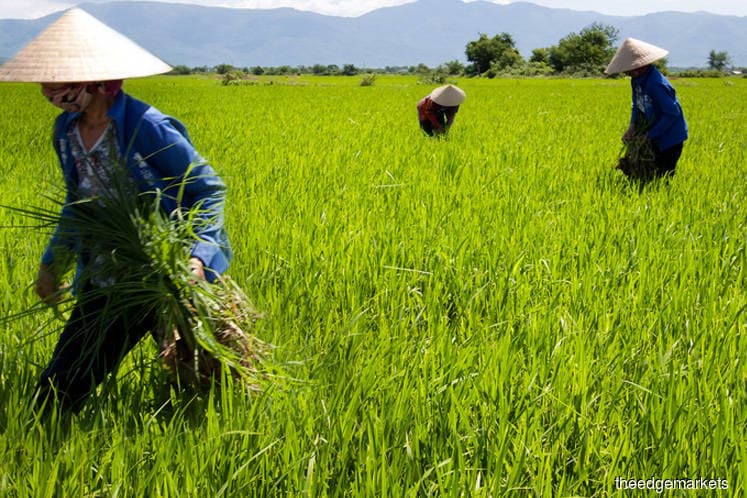
This article first appeared in The Edge Financial Daily on June 11, 2018
KUALA LUMPUR: Experts say the Malaysian government will need to carefully analyse and introduce a new framework for the paddy and rice industry following the dismantling of Padiberas Nasional Bhd’s (Bernas) monopoly in the sector.
Last Thursday, the government announced that Bernas’ monopoly to import rice has been terminated. A working paper on the breakup will be drafted with feedback from the agriculture and agro-based industry ministry and other stakeholders to be submitted to the government for further action.
“To protect the interests of local paddy farmers, we have identified the modules used in other countries [on importing the staple], among them Indonesia, which has been successful in its approach in opening up the monopoly on rice,” minister Salahuddin Ayub told reporters.
The president of the local unit of the UNI Malaysia Labour Centre (UNI MLC) Datuk Mohamed Shafie BP Mammal lauded the government’s move to break the monopoly but said it is necessary to formulate a well-thought-out and comprehensive plan to ensure there is fair trade and healthy competition among the players.
“Breaking the monopoly is a healthy move as it will encourage healthy competition. Then when there is no more monopoly, there must be a new framework. The government or minister needs to introduce a new framework which everybody understands and will benefit the rakyat, while the competition shouldn’t be pinching [customers] from one another,” he told The Edge Financial Daily via telephone.
“Now they (the government) want to introduce a new system so I think they must have a concrete and positive reason why they want to break the monopoly. Is it because the government thinks they cannot control Bernas or is Bernas weak?” said Mohamed Shafie, who is also a trade union leader involved in food and agro businesses.
“I’m not defending Bernas, but this is not something where you come today and you make a new decision for another five years. Bernas will be affected [by the government’s decision] and they might need to retrench workers,” he explained.
With the breaking up of the rice monopoly, independent economist Dr Chung Tin Fah said the government can save on subsidies while opening up opportunities for other players and prices can be lowered as well.
“Monopoly is bad in [the way] that it will limit consumer choice and the monopolist set prices to earn higher than a justifiable return,” he said.
Mohamed Shafie said Bernas’ monopoly over the country’s rice supply has become a hot-button issue about unfair trade practices, but the company still face certain limitations.
“Maybe now the government realises that there is something wrong with the import of rice and therefore they want to break the monopoly and give it (the same licence) to several other companies.
Meanwhile, Socio-Economic Research Centre Sdn Bhd (SERC) executive director Lee Heng Guie said the scrapping of the rice importation monopoly would mean the liberalisation process has been set in place, allowing other players to supply in the rice market.
“Pending the detailed structure and mechanism, the proposed policy should not only result in more sharing of profits among all rice dealers but also make rice affordable to the masses as consumers have more varieties to choose from.
“The liberalisation of rice importation would enhance food security rather than diminish it,” he said in an email reply.
Currently, 70% of rice demand comes from domestic producers while the balance 30% is imported from various sources, he noted.
Lee believes that the rice monopoly or giving out import permits to favoured importers had not only resulted in “rent-seeking” practices, but had also often led to high prices of rice for consumers, smuggling and arbitrage of price differentials between domestic and foreign rice.
“Rice is central to food security. It is a strategic commodity as the overall economic growth and per capita consumption depend on an adequate, affordable and stable supply of this staple crop,” he added.
Veteran economist and former civil servant Tan Sri Ramon Navaratnam said he hopes that this is the precedent for other monopolies to be broken down.
“This should not be the first and only monopoly to be broken down,” he quipped.
Bernas, the country’s sole rice importer was listed on the local bourse before it was taken private by businessman Tan Sri Syed Mokhtar Al-Bukhary in April 2014. During that time, the privatisation was met with strong criticism amid concerns that Syed Mokhtar, who already owned many strategic assets, for instance, ports and power plants, would monopolise the import of rice.
Bernas posted a pre-tax profit of RM133.39 million for the financial year ended Dec 31, 2016 (FY16), on a revenue of RM4.34 billion. Compared with FY15, Bernas’ pre-tax profit in FY16 grew 2.6% from RM130.05 million, while revenue rose 2.8% from RM4.23 billion.
Bernas is involved in the procurement and processing of paddy, importation, warehousing, distribution and marketing of rice in Malaysia, seed and farming activities, international rice joint ventures, as well as rice complementary businesses.
According to its website, Bernas continued to fulfil its obligations under a privatisation agreement signed with the government in 1996.
“These obligations include maintenance of the nation’s rice stockpile, acting as the buyer of last resort for paddy farmers, managing the Bumiputera Rice Millers Scheme and the distribution of paddy price subsidies to farmers on behalf of the government,” it said.
On March 30, 2017 The Edge Financial Daily reported that Bernas was eyeing a relisting in 2020, a year before the expiry of its rice import concession in 2021.